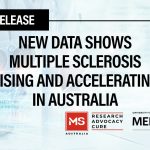MS Australia has awarded over $3 million in grants for multiple sclerosis (MS) research, providing a major boost in the fight against this increasing and accelerating disease.
Twenty-two new MS-focused projects, including studies that examine family genetics, the impact of diet on brain health, and the repair and regeneration of cells, have the potential to lead to significant advances in treatment and prevention, and in finding cures for MS.
MS Australia CEO Rohan Greenland says the grants, which range from one-year innovative studies to major three-year projects, will ensure that an extensive range of promising research avenues are explored in the pursuit of improving the quality of life for people living with MS.
“MS is extraordinarily complex, and we need to cover much ground to advance our understanding of the disease and to devise better approaches to combat it,” Mr Greenland said.
“We’ll be hitting MS from every direction with these research projects to ensure we go further and faster towards better treatments and prevention of the disease, and our ultimate goal of stopping MS in its tracks.
MS is the most commonly acquired chronic neurological disease affecting young adults and affects three times more women than men. As yet, there is no cure.
Alarmingly, a recent report discovered that MS is rising at an accelerating rate in Australia, with the number of people diagnosed from 2017 to 2021 increasing sharply by 30% (25,600 to 33,335).
While the exact cause for the increase in MS is not fully understood, some of the funded projects will aim to determine the causes more accurately.
The new grants also include fellowships and scholarships, continuing MS Australia’s commitment to investing in the future of Australia’s world-leading MS research workforce.
MS Australia President, Associate Professor Desmond Graham, congratulated the successful research teams and thanked those who had generously supported MS research.
“The projects and researchers funded are of the highest quality and have the most significant potential to make a difference for people living with MS,” Associate Professor Graham said.
“These projects are only possible thanks to the generosity of our state and territory Member Organisations and the Australian community who are as passionate and determined as we are for a world without MS.”
Urgent quest for the Holy Grail – a cure
In MS, the body’s own immune system mistakenly attacks and damages the fatty material around the nerves called myelin.
Myelin is important for protecting and insulating nerves so that the electrical messages that the brain sends to the rest of the body, travel quickly and efficiently.
Several of the funded research projects will focus on repairing and regenerating the cells damaged by MS, which could lead to a cure.
One of the studies looking into a cure will be undertaken by Associate Professor Jennifer Rodger from The University of Western Australia and the Perron Institute, WA.
Associate Professor Rodger will use a rapidly changing magnetic field — known as repetitive transcranial magnetic stimulation (rTMS) — to generate small electrical pulses in the brain to explore if this can improve the survival of myelin-producing cells (oligodendrocytes) in the brain.
If successful, this project would allow for treatments that will maximise the survival of oligodendrocytes to rescue brain function in people with MS.
Family genes to provide insights into causes and prevention of MS
A person’s genetics can influence their risk of developing MS. However, we do not know exactly which genes or how they cause MS to begin or worsen.
Dr Nicholas Blackburn from the Menzies Institute for Medical Research, University of Tasmania, TAS, will identify potential MS-associated genes by studying families where multiple members have MS.
Dr Blackburn will look for changes in genes that may lead to the disease by comparing the genes of family members with MS to those who do not have MS. After finding these genetic changes, the researchers will identify how they contribute to MS development.
Life-changing treatments for people living with MS
The treatment of MS has improved dramatically over the past decade through advances in the efficacy and number, of available therapies.
Many of the new research projects and fellowships will focus on further improving treatments for people with MS:
Ms Olivia Wills from the University of Wollongong, NSW, is exploring the role of diet in a brain-healthy lifestyle for people living with MS. Her project aims to advance our understanding of how diet can impact MS disease progression, management, and brain health.
This project will rationalise dietary choices and may lead to targeted nutrition approaches for brain health, including recommendations for people living with MS, their carers and their families.
Ms Alice Saul, from the Menzies Institute for Medical Research, University of Tasmania, TAS, will be focusing on the role of pain in MS. While pain is prevalent in MS, there is still uncertainty about the nature of MS-related pain, how pain fluctuates over time in the short and long-term, and how it relates to other symptoms of MS.
Ms Saul’s project will improve our understanding of the type of pain associated with MS to develop advice on pain management and to design treatment intervention studies for specific types of pain.
Dr Jennifer Massey, from St Vincent’s Centre for Applied Medical Research, NSW, will investigate the role of Epstein-Barr virus (EBV) in people with MS who have had their immune system “reset” using AHSCT.
EBV is a very common virus that causes glandular fever and is a known risk factor for developing MS.
The researchers will determine whether people with MS who have undergone Autologous Haematopoietic Stem Cell Transplant (AHSCT) and who have developed a new immune system capable of rapidly controlling EBV are more likely to have a sustained response to MS treatment.
The full details of all new research projects funded in 2023 can be found here.
-ends-
MEDIA CONTACTS:
media@msaustralia.org.au
Sarah Morrison – 0400 477 527
Lisa Montague – 0412 002 544
https://www.msaustralia.org.au/
About MS
MS is the most common acquired chronic neurological disease affecting young adults, often diagnosed between the ages of 20 to 40 and, in Australia, affects three times more women than men. As yet, there is no cure. There is no known single cause of MS, but many genetic and environmental factors have been shown to contribute to its development.
In MS, the body’s own immune system mistakenly attacks and damages the fatty material – called myelin – around the nerves. Myelin is important for protecting and insulating nerves so that the electrical messages that the brain sends to the rest of the body, travel quickly and efficiently.
As the myelin breaks down during an MS attack – a process called demyelination – patches of nerves become exposed and then scarred, which renders the nerves unable to communicate messages properly and at risk of subsequent degeneration. This means that the brain cannot talk to other parts of the body, resulting in a range of symptoms that can include a loss of motor function (e.g., walking and hand and arm function, loss of sensation, pain, vision changes and changes to thinking and memory).
About MS Australia
MS Australia is Australia’s national multiple sclerosis (MS) not-for-profit organisation that empowers researchers to identify ways to treat, prevent and cure MS, seeks sustained and systemic policy change via advocacy, and acts as the national champion for Australia’s community of people affected by MS.
MS Australia represents and collaborates with its state and territory MS Member Organisations, people with MS, their carers, families and friends and various national and international bodies to:
- Fund, coordinate, educate and advocate for MS research as part of the worldwide effort to solve MS
- Provide the latest evidence-based information and resources
- Help meet the needs of people affected by MS.




